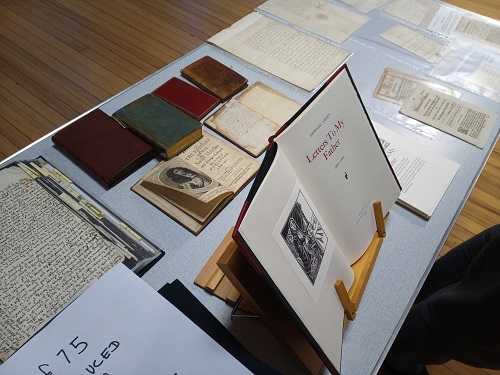
The penultimate talk in our 2022/3 season attracted 55+ members and guests, another pleasing attendance for the society. Local Shipton resident Simon Randall gave us an fascinating survey of key events in the English Civil Wars with particular reference to the Cotswolds.
A feature of the evening was Simon’s display of his personal collection of historic books and documents relating to events and personalities of the period. This added a uniquely interesting slant to the subject matter of his talk, and certainly enhanced our post-talk conversation and interest.
A key element to the display was Simon’s 2005 book “Letters to my Father” which was available on the evening at a special members price, with proceeds going to society funds. This is a beautifully bound book, illustrated with twelve linocuts by Clare Melinsky.
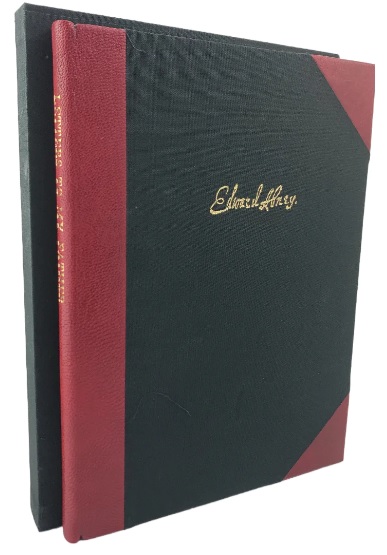
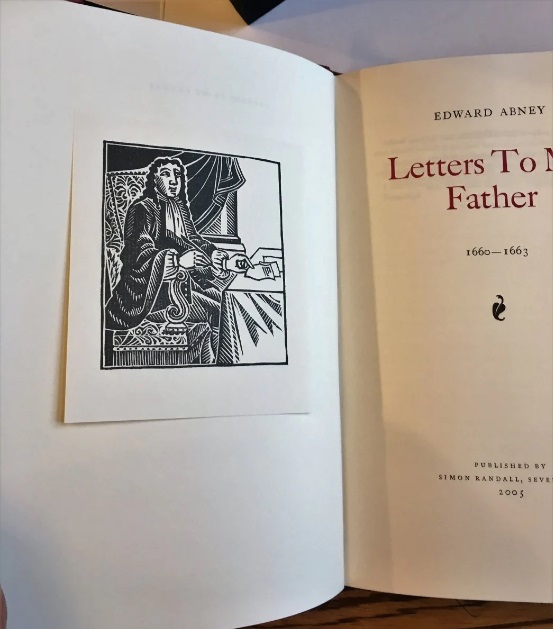
Why the English Civil War?
Simon became interested in the English Civil War during his years of employment in the legal profession, when one day he was told by a colleague that the offices of a former employer were being cleared out, and it was possible that a large number of documents were being consigned to a skip.
Intrigued, he investigated, and found amongst much else, a set of interesting-looking papers. These he kept for several years, unopened and unread, until one day on further investigation, he discovered that they were the correspondence between a father and son during the post-Civil War early 1660s.
This period saw the government under Charles II moving to punish the regicides – the sponsors of the document which sealed the fate of Charles I. Families of the regicides were implicated, especially in terms of forfeiture of estates. And so those Abney family letters between a father and son over the son’s desire to marry, and the inter-family consequences, shed light onto the tensions which existed in these times in the aftermath of the war and the Commonwealth’s demise.
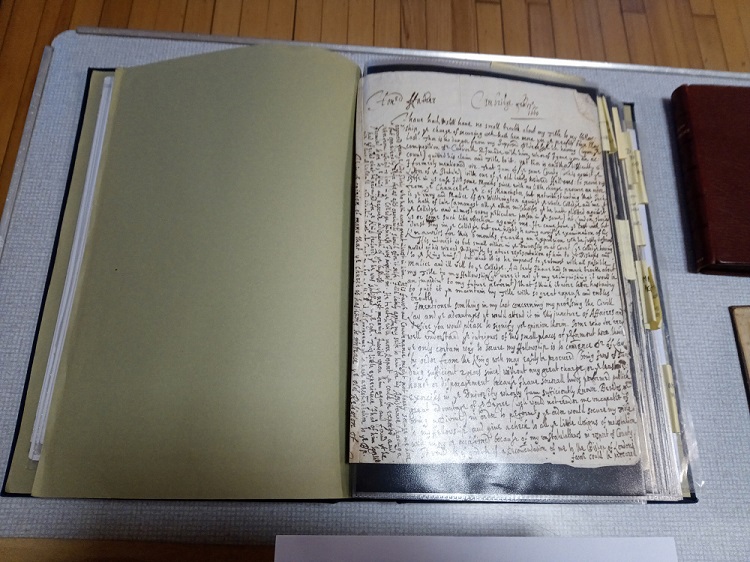
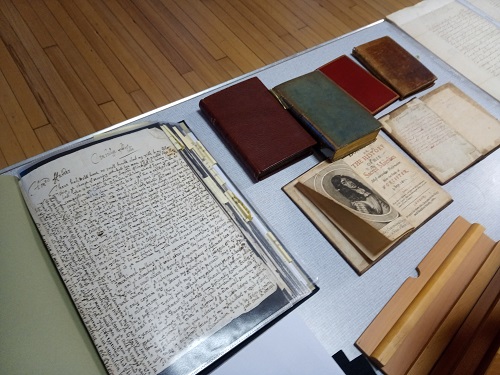
The Talk in Outline
Simon took us on a whistle-stop tour of the principal reasons for the Civil War of 1642-49, which included inter alia the outdated concept of the Divine Right of Kings, the discontent with absentee landlords and the opposition by Puritans to the ecclesiastical hierarchy. In particular relevance to the Cotswolds was the opposition to a Ship Tax in a region with no borders to the sea!
Of course, also relevant to our region was the fact that the King, initially having set up his flag at Nottingham, moved his court to Oxford where the University supported him, but the townspeople did not. And significantly, the last major battle took place at Stow-on-the-Wold in March 1646.
His talk covered key social and economic effects of the war, key events and battles, and of course the aftermath and its implications for the main players in the conflict. We learned for example that neither side had a trained army in 1642, although 75% of aristocracy had experience of war and joined the Royalists.
These Royalist supporters recruited their employees for the army. The Earl of Loughborough for example, recruited miners working in his coalmines in the East Midlands which naturally resulted in coal shortages. In terms of changes and appropriation of resources meantime, the Cotswolds was a hugely important area with natural resources for war, including iron for weapons and with timber and coal in Forest of Dean; Wool, Cloth and Corn from the Wolds; Fruit and Vegetables from the Vale and Tobacco (surprisingly to many) from Tewkesbury and Winchcombe.
Many individuals took no part in the War and remained neutral, although everyone was affected. Leading family members had to decide allegiance with potential consequences. Simon gave us a particularly poignant quote by Sir William Waller – ” I detest a war without an enemy”.
Books and Documents
Illustrating some of the key elements of his display of books and documents, Simon highlighted a particular letter by the King’s wife Henrietta Maria. She was accused of encouraging foreign armies to come in on the side of the Royalists, but the letter highlights the true nature of her involvement: a trading arrangement for arms and munitions to support the cause of her husband via the wool trade.
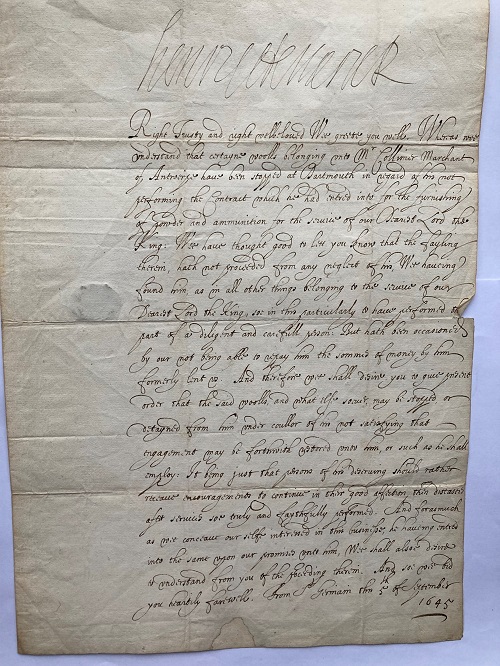
HENRIETTA MARIA SIGNED LETTER DATED 5 SEPTEMBER 1645
Right trusty and right wellbeloved We greet thee. Whereas we understand that certain wool belonging unto Mr Collimir Marchant of Ant have been stopped at Dartmouth in regard of his not performing the contract which he had enteredd into for the furnishing of powder and ammunition for the service of our Dearest Lord the King we have thought good to let you know that the failing therein, hath not proceeded from any neglect of his, we having found him as in all other things belonging to the service of our Dearest Lord the King, so in this particularly to have performed the part of a diligent and careful person: But he been occasioned by our not being able to repay him the sum of money by him formerly lent.
And therefore we shall desire you to give instant order that the said wool, and what else, may be stoped or distanced from him under [coullor] of his not satisfying that engagement may be forthwith restored unto him, or such as he shall employ: it being just that persons of his deserving should rather receive encouragements to continue in their good affection thin [distates] after services so truly and faithfully performed. And for as much as we conceive our self interest in this business, he having entered into the same upon our promises unto him, we shall also desire to understand from you of the proceeding therein. And so we bid you heartily farewell.
From St Germain this 5th of September 1645.Letter addressed: To our right trusty and right wellbeloved the Lords and others of the Council to our Dearest Son the Prince of Wales.
Personalities in the Cotswolds
Of the several Cotswolds personalities in Simon’s presentation, we can highlight these four:
Prince Rupert
Prince Rupert, the King’s nephew was a courageous horseman but occasionally impetuous.
He joined Charles I shortly before the outbreak of the Civil War in August 1642.
He fought at Edgehill, Cirencester, Bristol, Marston Moor, Naseby and Oxford.
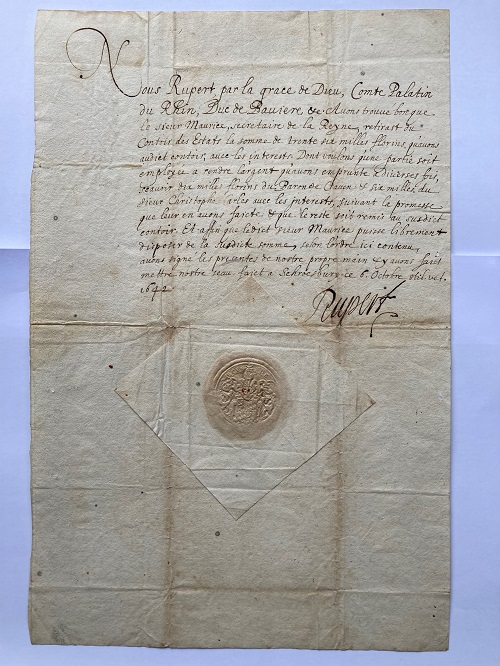
Peter Heylyn
Peter Heylyn was born in Burford and ws one of Charles I’s chaplains and the author of range of pamphlets .
In 1639 he became Rector at South Warnborough, Hampshire.
He suffered for his loyalty to the king when, under the Commonwealth , he was deprived of his preferments.
He subsequently settled at Lacies Court in Abingdon from 1653 until 1660.
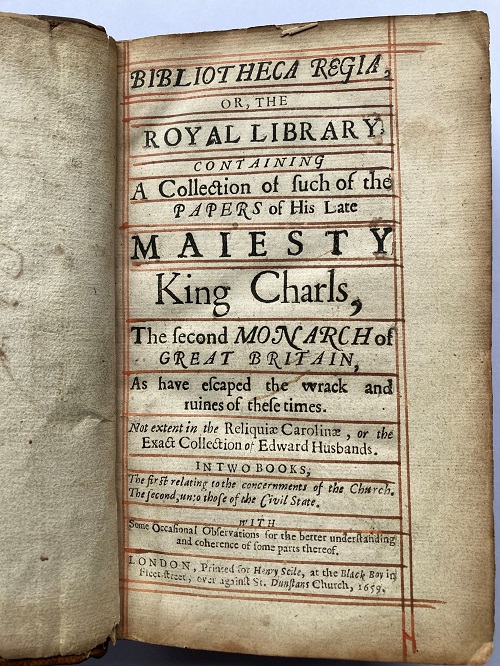
William Lenthall
William Lenthall lived for many years at the Priory, Burford.
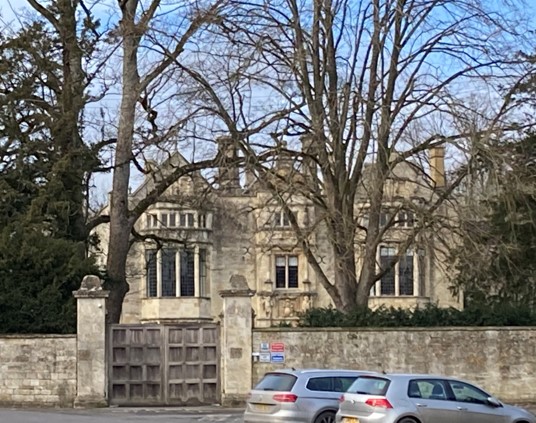
He was speaker of the House of Commons during most of the English Civil War and was most famously involved in a key event: the personal confrontation between the King and Parliament at the start of hostilities.
Addressing Lenthall in the chamber, the King, accompanied by men at arms, said “Mr Speaker, I must for a time make bold with your chair”.
Lenthall vacated it. Calling first for one of the members, and then another, Charles was met with total silence. He asked the speaker where they were. Kneeling, Lenthall responded:
May it please your majesty, I have neither eyes to see nor tongue to speak in this place but as this House is pleased to direct me whose servant I am here; and I humbly beg your majesty’s pardon that I cannot give any other answer than this to what your majesty is pleased to demand of me.
It was the first time that a speaker had declared his allegiance to the liberty of parliament rather than the will of the monarch. Momentous indeed.
Marchmant Needham
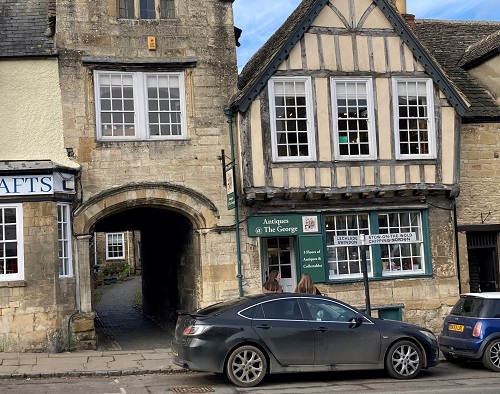
Born at The George Inn, Burford, Needham was a prolific writer and was reckoned to be the first newspaper editor. He worked for for Charles I, then Oliver Cromwell during the Commonwealth, and for Charles II at the restoration. He has been described as “the world’s first great journalist”
Further Notes to the Aftermath
As part of necessary reparations and fund raising after the devastating consequences of the wars, a Sequestrian Committee was set up in 1643 to allow the confiscation of Royalists estates during the commonwealth. In 1655, a detailed catalogue was produced in book form of the Lords, Knights and Gentlemen that had compounded their Estates. The value in total for these estates was £1,239,769, equivalent £266,547,999 today.
So-called Compounding of Delinquents rules were set up to allow the buying back the estates based on value, and a promise not to take up arms again. Here is how some Cotwolds gentry were affected.
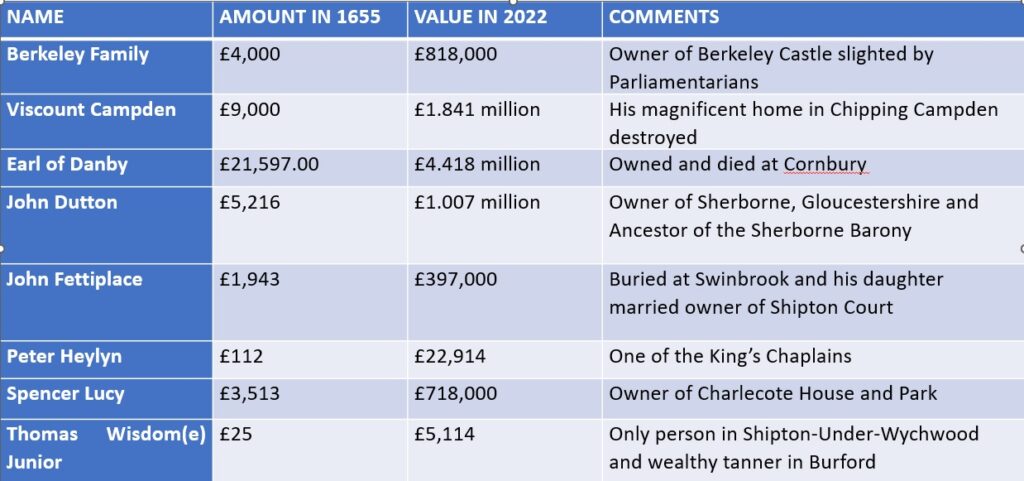
About Simon Randall
Although Simon Randall only moved to Shipton-under-Wychwood in February last year he has had a long association with the Cotswolds having owned a house in Blockley for over 30 years and founded the charity, Friends of the Cotswolds, which owns the Old Prison at Northleach. His consuming interest in the English Civil War arose following the 30 minutes he spent in a rubbish skip in Lincoln’s Inn.

